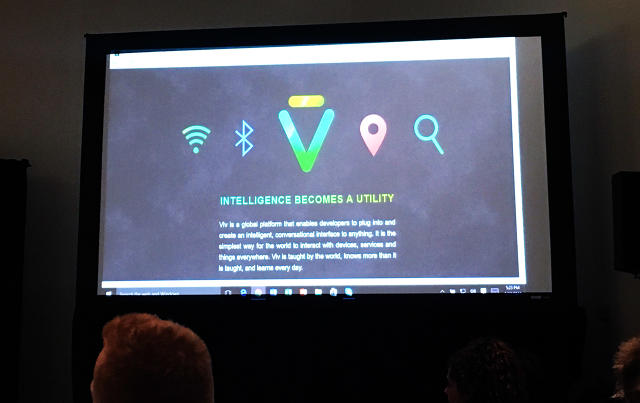“Siri, What’s Viv?”
“Siri, what’s a better voice assistant than Siri?”
“Go to hell.”
That may be an exaggeration, but today some of Siri’s original creators formally unveiled a next-generation assistant, known as Viv, that’s capable of responding to far more complex questions or commands than current versions of Apple’s bot by writing dynamic programs in real time to answer queries of all kinds.
The proof? Not just asking a voice assistant what the weather is, but asking whether it will be warmer than 70 degrees near the Golden Gate Bridge the day after tomorrow, or if it rained in Seattle three Thursdays ago.
Getting a bot to tell you the weather may seem trivial, but to hear Dag Kittlaus, Viv’s cofounder and CEO, tell it at TechCrunch Disrupt in New York today, people want and need far more than that in their lives today, and the state of consumer voice assistants is ready to advance well beyond what’s possible with the tool built into millions of Apple devices.
And what’s driving this new generation of intelligent voice assistants? Our broad need for a single assistant that’s personalized for us and knows our preferences, works across all our devices, and is infinitely extensible.
Viv, which has been in stealth for four years, was founded by Kittlaus and Adam Cheyer, who were original cofounders of Siri at Silicon Valley’s SRI International. Apple eventually acquired the SRI spin-off in 2010 and integrated the voice assistant into the iPhone.

The new service, which Kittlaus said will be launched “toward the end of the year,” will grow and evolve as thousands of developers add new capabilities to it. He explained that the system was designed to figure out how to answer complex questions through what he called “dynamic program generation,” a way of understanding user intent and having its underlying software write a script to answer the question. All in mere milliseconds.
If it works as promised, that would be a major advance over current “intelligent” voice assistants, which rely on scripted query and response systems, and as a result, often don’t give us what we’re looking for.
Viv is talking to “major companies” around the world in order to put its voice assistant on all kinds of devices. Kittlaus predicted that in a few years, Viv’s logo will be found on all manner of devices, from phones to Internet of Things appliances, indicating that people can interact with them simply by using their voice.
Huge Interest In Assistants
There’s a huge amount of interest in virtual-assistant software. Every big tech company—Facebook, Apple, Amazon, Google, and Microsoft—has invested in the technology, and according to the Washington Post, both Google and Facebook have made offers to acquire Viv. The Post also reported that Facebook CEO Mark Zuckerberg has a stake in Viv via Iconiq Capital.
Viv on its own is not capable of interpreting and acting on complex demands. Rather, it relies on partnerships that tie into data from restaurant chains, movie-ticket vendors, and others, that can help it parse the kinds of questions people ask in real life.

The company is building a network of partners, and a “developer center,” both of which will be instrumental in scaling the system over time.
That presents a large opportunity for Viv to assemble a roster of partners into all areas of our lives. One can imagine it working with airlines, concert promoters, restaurant reservation systems, flower delivery services, and so on. On stage, Kittlaus mentioned Uber, Hotels.com, Weather Underground, Venmo, and ProFlowers.
If that’s how things go, Viv would be a big step up from current-issue systems like Siri that can respond to queries if they’re asked in a way that matches those in pre-scripted libraries. By comparison, Viv is said to be capable of understanding spontaneous requests and questions.
GrubHub chief executive Matt Maloney told the Post that he eagerly signed on as a Viv partner two years ago, “impressed with the idea of allowing consumers to perform different activities without having to toggle between services. No one has been able to say, ‘I want the movie ticket, and the bottle of wine, and some flowers on the side’—all in one breath,” he said.

The Post reported that Viv is in discussions with makers of TVs, connected home appliances, auto makers, and others, all looking for ways to build a broad network of services and devices that users can interact with through Viv.
For Kittlaus and Cheyer, Viv represents a return to the original promise of Siri. When they first built it, at SRI, the tool was able to process numerous complex commands without resorting to search results or forcing users to download additional apps, noted the Post. By the time Apple launched its version of Siri, much of that functionality had been stripped out.
Viv “is what they wanted Siri to become—an open system,” Bart Swanson, an adviser at Horizons Ventures who has invested in Viv, Siri, and additional AI tech, told the Post.
The question then, given that Kittlaus said Viv is in partnership with major device makers, is whether Apple is ready to jettison Siri.
“Siri, will the iPhone have Viv?”
Fast Company , Read Full Story
(29)











